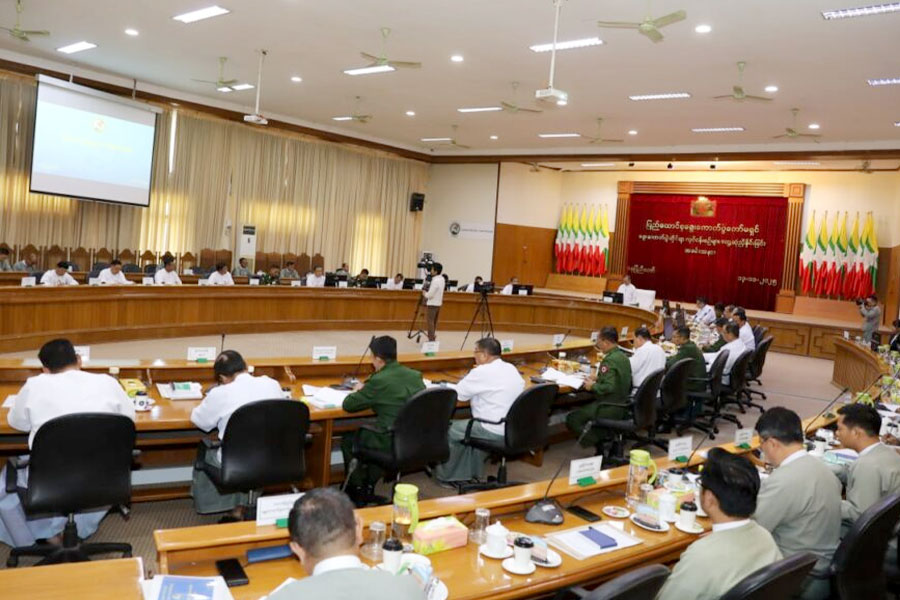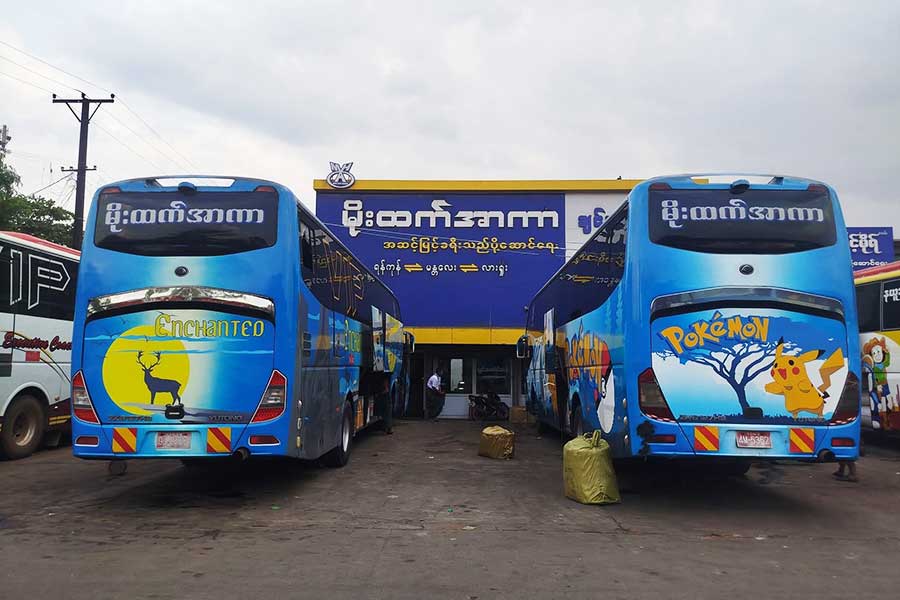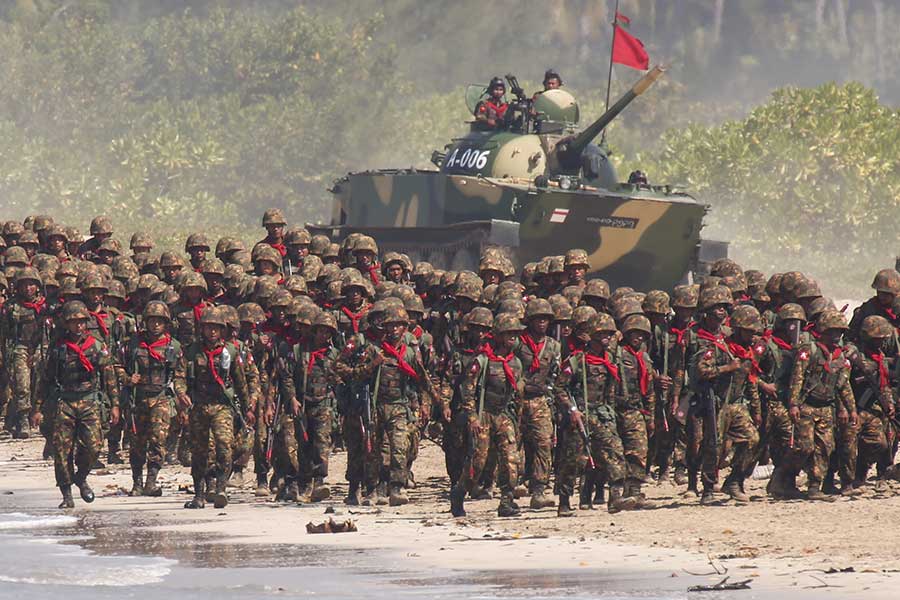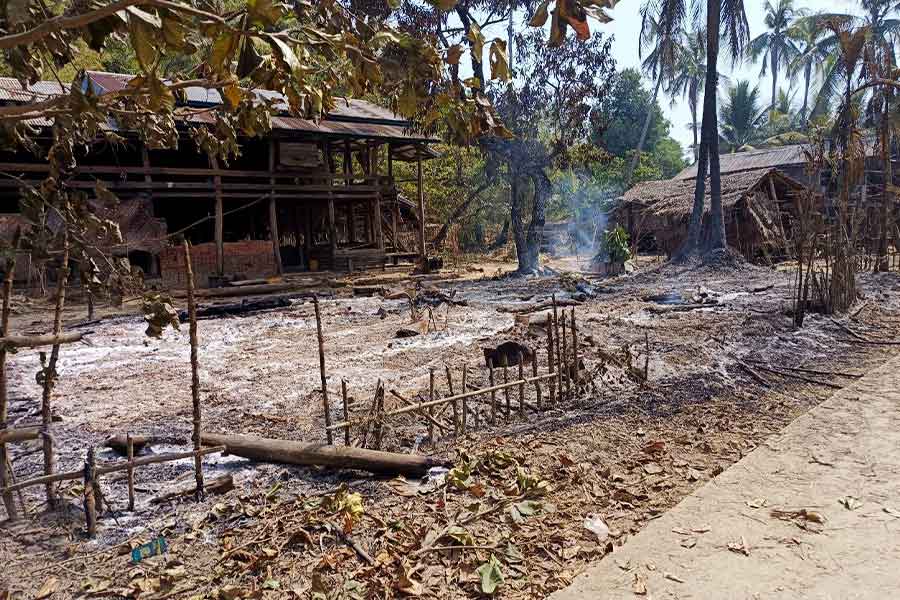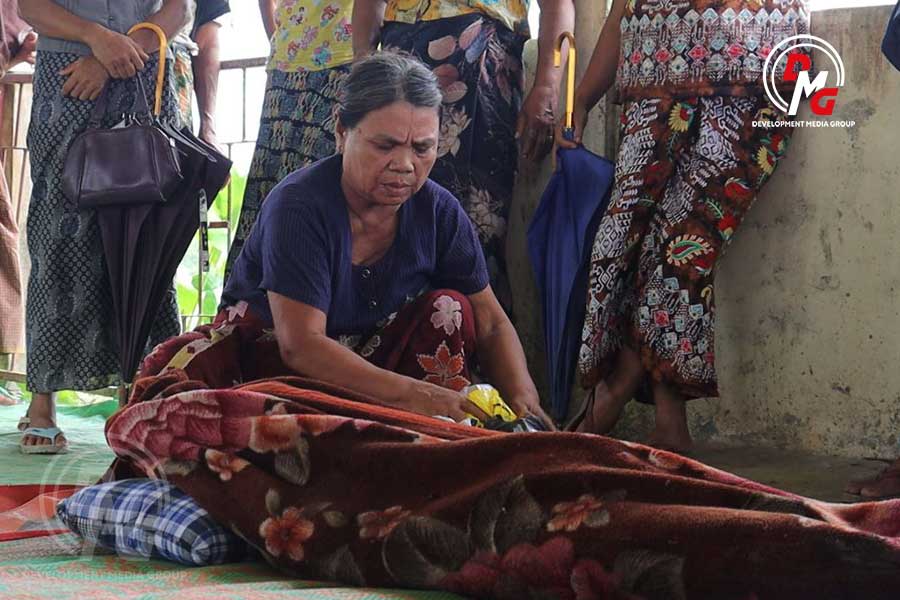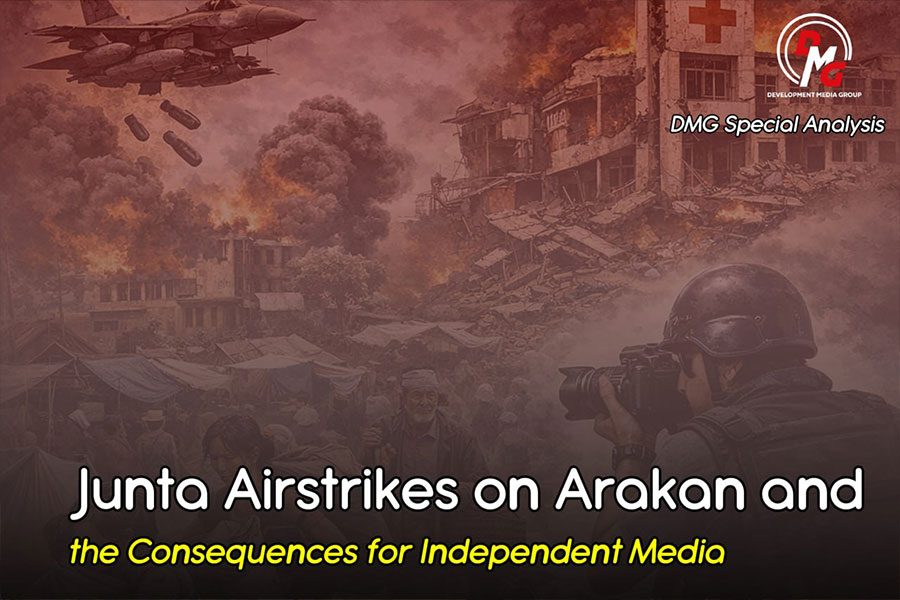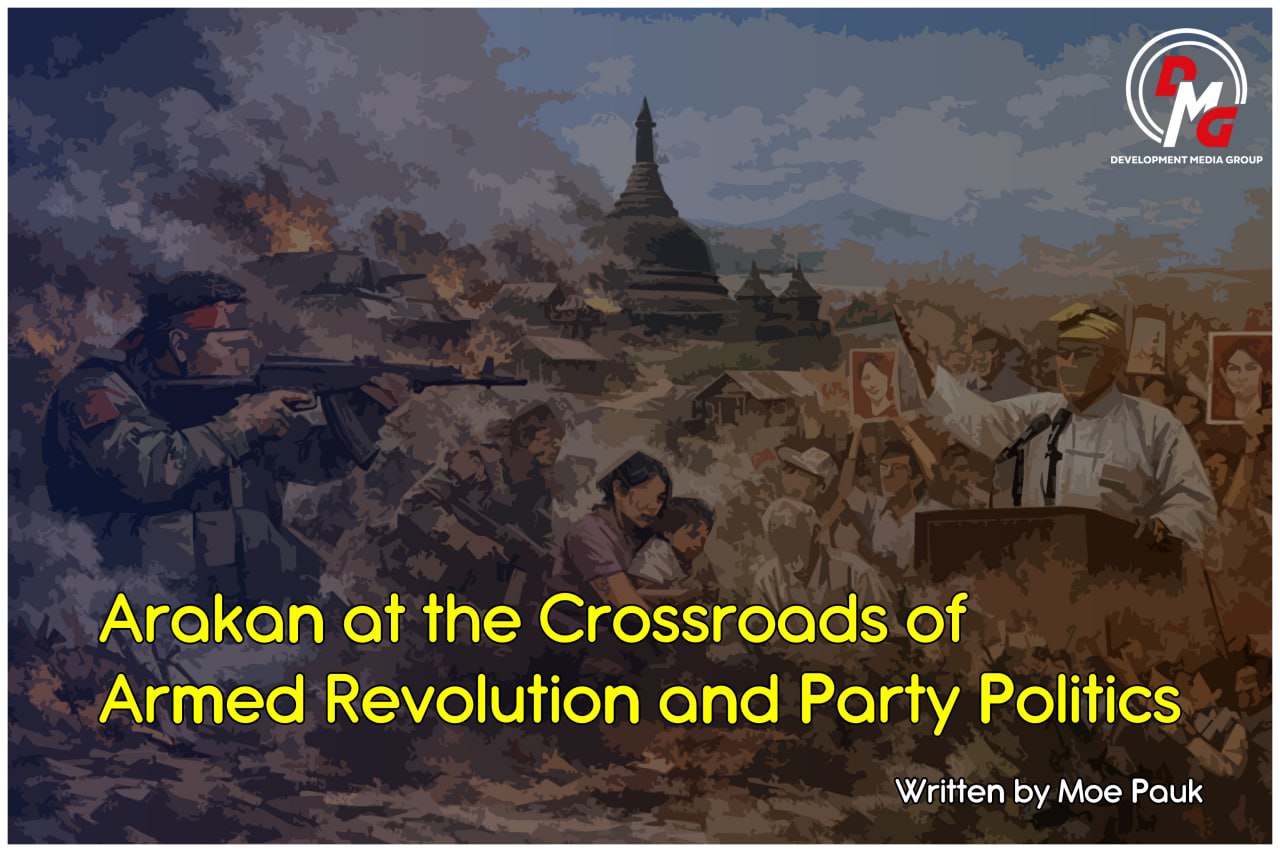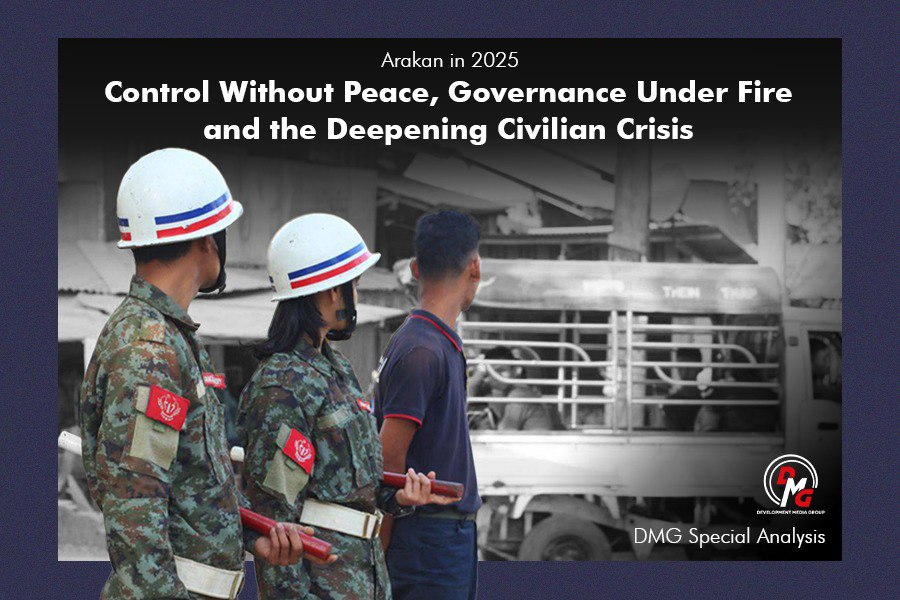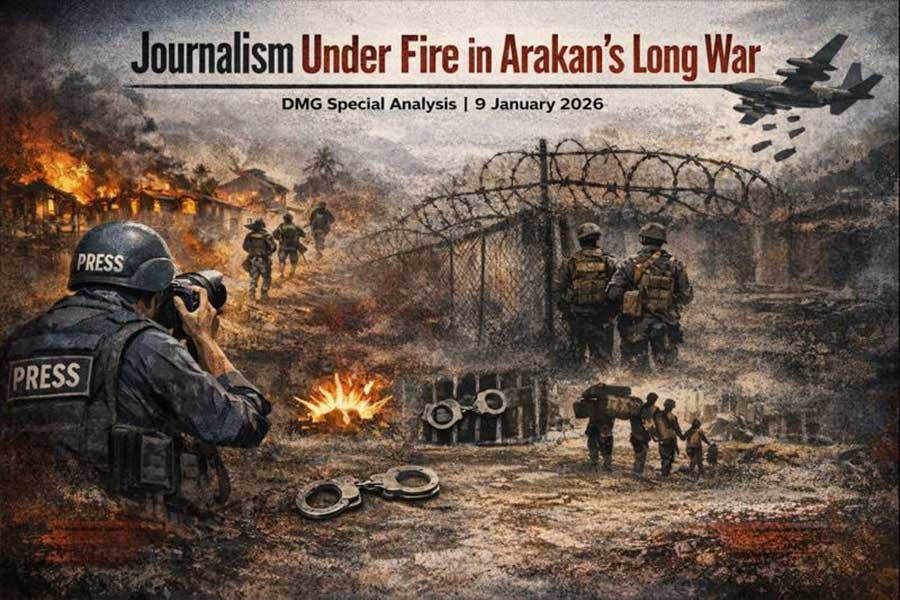- UEC announces 1,025 MPs elected in 2025 general elections
- Junta tightens travel restrictions on Arakanese people in mainland Myanmar
- Regime steps up offensive toward Arakan State via Ayeyarwady coastal route
- Elderly IDP killed, two others injured in junta airstrike on Kyaukphyu village
- AAPP urges urgent international action as junta crimes against humanity escalate
Growing Influence and Unease in Arakan State
The Arakan Army’s stay-at-home announcements were posted in public places and shops in towns and villages across the state, and the ethnic armed organisation’s outreach even included the release of videos by AA chief Maj-Gen Twan Mrat Naing, warning people about the dangers of Covid-19.
14 Feb 2022
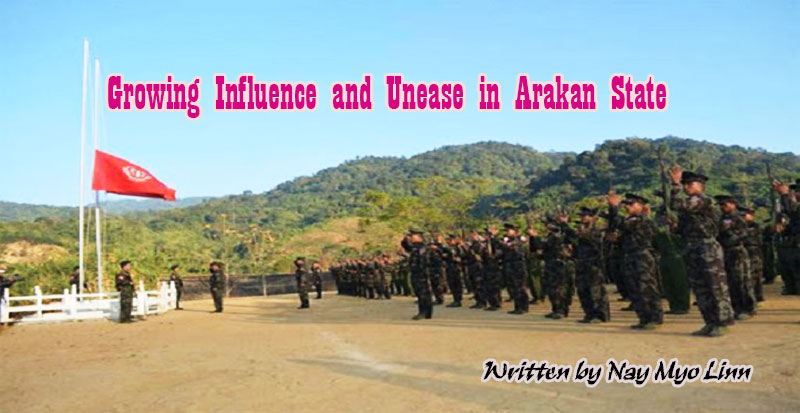
Written by Nay Myo Linn
An Arakan flag is hoisted in front of the stage of Arakha Mandai Khit Thit, a popular traditional zat pwe troupe in Arakan State. “The Arakan national flag is the goal of the Arakanese people, the lifeblood of the Arakanese people. As long as there is an Arakan state, the spirit of the Arakanese people will not collapse,” a man in the background announces in the Arakanese language.
Fighting has mostly ceased in Arakan State, but the Myanmar military is keeping a close eye on nationalist movements. Despite the military surveillance, the Arakha Mandai zat pwe troupe is touring all over Arakan State, with the artists wearing guerrilla costumes and singing national anthems; a testament to how influential the Arakan Army is in Arakan State.
The Arakan Army (AA) was formed in Laiza, Kachin State, on April 10, 2009, to fight for the liberation of Arakan State. AA troops joined forces with a trio of allies — the Kachin Independence Army (KIA), Ta’ang National Liberation Army (TNLA), and Myanmar National Democratic Alliance Army (MNDAA) — to attack the Myanmar military in order to gain military experience. The Arakan Army tried to enter Arakan State in 2015 and clashed with the Myanmar military.
More than three years later, the Arakan Army launched fierce attacks on the Myanmar military in December 2018. The two sides reached an informal ceasefire agreement in November 2020, after two years of deadly and devastating conflict. Following the cessation of hostilities, the Arakan Army has attempted to strengthen its administrative machinery and gain influence in Arakan State.
Junta forces are unlikely to want renewed fighting with the powerful Arakan Army in Arakan State, as the military regime cracks down on anti-coup fighters and revolutionary forces across the country. Amid the national upheaval, the Arakan Army took advantage of an opportunity to focus on administrative and judicial matters while the Myanmar military focused its attention and firepower pretty much everywhere except Arakan State.
Consider the Arakan State public’s contrasting responses amid an alarming rise in Covid-19 cases last year: Orders and advice from the military regime regarding pandemic preventive measures largely went unheeded, but when the Arakan Army’s political wing, the United League of Arakan (ULA), declared a stay-at-home order, compliance was widespread.
The Arakan Army’s stay-at-home announcements were posted in public places and shops in towns and villages across the state, and the ethnic armed organisation’s outreach even included the release of videos by AA chief Maj-Gen Twan Mrat Naing, warning people about the dangers of Covid-19.
Currently, the Arakan Army has assigned political officers in the township and village levels, and has taken charge of certain administrative functions. The villages also have village administrators appointed by the military regime, but in practical terms, their authority is no longer recognised in many cases. The authority of community leaders appointed by the Arakan Army overrules.
In rural areas, cases of injustice including violence, theft, and land disputes are no longer brought to the military regime’s judicial apparatus, and instead locals report their grievances to community leaders appointed by the Arakan Army. In August of last year, the Arakan Army went so far as to pledge to address issues of crime, punishment and justice via a parallel judiciary.
“The people do not complain to the military council if there is a case, and the authorities have been doing injustice in Arakan State for generations,” said Ko Zaw Win, a resident of Kyauktaw. “Therefore, they are trying to operate under the Arakan Army’s administration, saying that it is better for the people not to have a military council. Therefore, the people do not complain to the military council, but instead to the Arakan Army, because they wanted the Arakan Army’s administration to function.”
The Arakan Army has been able to extend its administrative reach across much of Arakan State because the people trust the ethnic armed group more than the Myanmar military.
“The police can no longer do the work of the police and the judge cannot judge,” U Pe Than, an Arakanese political analyst, said of the military regime’s slipping hold on governance in Arakan State. “The people can no longer rely on the [junta’s] administrative machinery. For example, if there is a robbery in the area, the police will not be able to go out and arrest as before. With the collapse of the administration and the judiciary, the people put their trust in ULA/AA.”
Students at some schools in northern Arakan State townships such as Minbya, Mrauk-U, Kyauktaw, Ponnagyun, Rathedaung and Buthidaung have reportedly been singing the Arakha national anthem since last year.
As the Arakan Army’s influence in Arakan State grows, so does the military regime’s unease. Members of the junta have summoned locals and administrators, warning them not to participate in the ULA/AA administration.
Though Arakan State has been relatively peaceful compared with the rest of post-coup Myanmar, fighting between junta troops and the Arakan Army flared anew in Maungdaw Township earlier this month.
The Arakan Army has also criticised the Myanmar military for blocking the transport of basic foodstuffs, such as rice, iodised salt and medicine, leading to food shortages and ratcheting up tensions.
U Pe Than, the Arakanese political analyst, said a larger conflict could reignite at any time.
“The informal ceasefire between the Arakan Army and the Myanmar military is a verbal agreement. Peace built on only promises and understanding will not last,” he said.




